#hungarian folk song
Explore tagged Tumblr posts
Text
Hut deep in the forest. It was lived by the gray old man. The rabbit jumped towards him.
Please, please help me!
The hunter is running after me!
Come, come, little bunny!
Never be afraid little bunny! The two of us will , get along well.
#belching#burping#it's a kind of little poem#bunny#old man#funny story#creepy story#hungarian folk song
2 notes
·
View notes
Text
youtube
0 notes
Text
ezt annak a 3 embernek osztom meg akik magyar curse of strahd dmek/játékosok és nem ismerem őket személyesen 🫡
#curse of strahd#for the english speaking folks: this is a curse of strahd playlist but it's only hungarian songs#to pair with my (astonisgingly popular) barovia public radio#barovia magyarrádió#Spotify
2 notes
·
View notes
Text
The 𝕲𝖊𝖓𝖊𝖗𝖆𝖑's theme


youtube
Powerful, passionate, intense right from the very start. Opening with a cry, just like how her nightmare of a life began with her first cry for air. Fast paced music with even faster taps, she was ahead of everyone, lived life faster than it was happening, trained extremely hard to become a living weapon. Always on the edge, on the run, in danger, in war, the pressure never letting up, the brutal pace only increasing slightly till the somber notes of the guitar cutting through the lively pace foreshadow her fall.
Even after the music, she's still dancing. Still fighting till the very end. The voice taking over along with a few plucks of strings is when the betrayed, dying General looks at her fallen, massacred army, men and women, children she fought with, for and loved deeply. The soul cutting realization of the situation along before she slowly succumbs too to her injuries.
But it's far from over. She spirals down to Hell and the music picks up immediately with a key difference: instruments only, the dance steps nowhere to be heard. Besides the Spanish guitar, new instruments added, panic, wild, untamed aggression. Dissonance as she battles with the Hellfire trying to destroy her mind. Frantic howls, cries of agony, rage, desperation in shape of electric guitar from a woman on the very edge of insanity with refusal to submit. The moment when fight is won, when the Hellfire General was truly born and became a threat to both realms is when the shoe taps return, accompanied by the melodic voice.
The gentle aria is in contrast of the wild music and sounds, encompassing the love for her army, her family that keeps pulling her back from the edge, keeps her mercilessly pushing, charging forward. The slams of the shoes are also different this time, now they don't sound like dance steps but a vicious wardrum instead. The sound becomes dominant over the strings, instruments; louder and louder with brutality, she is in complete control of her powers and sees her aim clearly.
The stop is abrupt, yet it's not the end again. Only the gentle ode trails on, symbolizing her transcendence to Horseman of War. It is reminiscent to an ancient warrior's epic: a tale of defiance, war, passion, bloodshed, tragedy, sacrifices and power to become her destiny; taking humanity's side at last.
#⚔ music 🔥 | secret passion of the blade dancer#⚔ headcanon 🔥 | nem tudom mi vagyok; de tudom 𝐤𝐢 𝐯𝐨𝐥𝐭𝐚𝐦#I thought I will understandably end up with a Hungarian folk song/ballad but THIS. this is perfection. shivers every time.#⚔ alright/encourage to like and reblog 🔥 | no grave can hold me#Youtube
2 notes
·
View notes
Text
youtube
#song tag: Daru madár gyere velem#language tag: hungarian#culture tag: romani#culture tag: hungary#folk music#folk song#have you heard this folk song#Youtube
6 notes
·
View notes
Text
Járjál babám addig sírva
Míg a fűzfán terem szilva
Az akácfán piros alma
S az akácfán piros alma
~ A Láli Nénié
3 notes
·
View notes
Text
I think my favourite part of Hungarian folk songs is shouting out random household objects. Like, hell yeah, S P O O N
3 notes
·
View notes
Text
Ne aludj el, két szememnek világa
Mert már feljött piros hajnal csillaga
Ne aludj el, két szememnek világa!
Mert már feljött piros hajnal csillaga
*
Egyik csillag Kostyál János csillaga
Másik csillag Piros Anni csillaga
Ne aludj el, két szememnek világa!
Mert már feljött piros hajnal csillaga
*
Amit adtál a jeggyűrűt vedd vissza!
Homály fedi gyémántkövét, nem tiszta
Ne aludj el, két szememnek világa!
Mert már feljött piros hajnal csillaga
-----
my favourite Hungarian folk song (starts around 8:30 in the below recording) - it's an end-of-love song, about János and Anni, like stars, like flowers - they wake up in the morning and she says to him (loose translation) "take back the ring that you gave me - the diamond has gone cloudy" which is such a heavy burn and anyway the harmonies are amazing
I first heard this on someone's old cassette they gave to me at college and it took another 20 years before I got to find out what the song was about (had to wait for the internet yes I'm that old)
youtube
5 notes
·
View notes
Text
Variations
Composers have used variations in music for centuries. Renaissance and Baroque composers wrote variations on a short tune in the bass which was repeated again and again. Handel wrote a famous set of variations for harpsichord and Bach wrote his monumental Goldberg Variations. Mozart, Beethoven Brahms, Elgar, Schoenberg and Britten all contributed to the genre so the the prohramme today explores…

View On WordPress
#Antal Dorati#Benjamin Britten#Classical Music#composers#Edward Elgar#Enigma Variations#Glenn Gould#Goldberg Variations#J.S Bach#Johannes Brahms#John Eliot Gardner#Libor Pesek#Liverpool Philharmonic Orchestra#London Symphony Orchestra#Music#Paul Archibald#Philharmonia Hungarica#RTHK Radio 3#Valery Gergiev#Variations on a Hungarian Folk Song ‘The Peacock’#Variations on a Theme of Haydn#Vienna Philharmonic Orchestra#Young Person’s Guide to the Orchestra#Zoltán Kodaly
0 notes
Text
Ballads of the Hanged: Swinging from the Gallows Tree
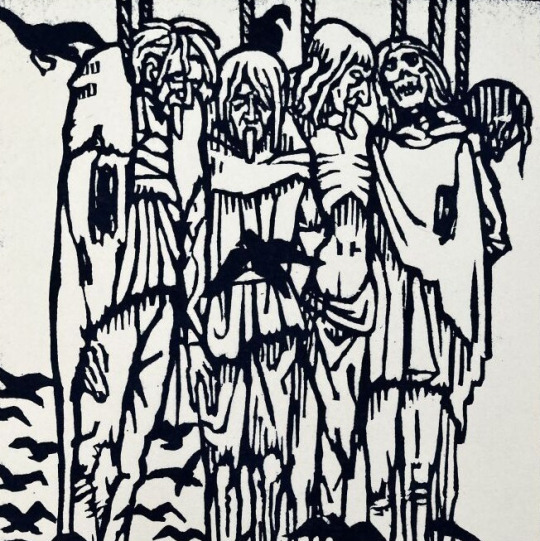
A mixtape of execution ballads and assorted tales of guilt, wrath, terror, and defiance on the gallows, where all men are brothers.
[on spotify]
21 tracks, 1h 15min in full (spotify lacks one song)
I teased this many moons ago, and I finally finished it. No booklet in PDF form (too much hassle), but I got extensive liner notes, which you can also read here, for more pictures and a wider format. Enjoy!
LINER NOTES
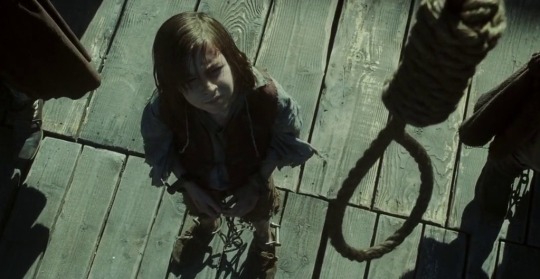
1. Hans Zimmer - Hoist The Colours
Heave ho thieves and beggars never shall we die
What a heartbreaking thing to say on the scaffold. But we have to start with theatrics and a drum roll, and our introduction needs no introduction.
2007, from Pirates of the Caribbean: At World's End OST lyrics: Ted Elliott & Terry Rossio music: Hans Zimmer & Gore Verbinski
2. Shirley Collins - Tyburn Tree (Since Laws Were Made)
Next stop, Tyburn: England's most notorious gallows. In The Beggar's Opera, the highwayman Macheath (later also known as Mack the Knife) observes that if they hanged rich criminals like they hang the poor ones, "'twould thin the land". Shirley Jackson subtly changed this to the better.
Since laws were made for ev'ry degree to curb vice in others as well as me, I wonder there's no better company on Tyburn Tree.
But since gold from laws can take out the sting, and if rich men like us were to swing, it would rid the land their numbers to see upon Tyburn Tree.
recorded 1966, released 2002 in Within Sound lyrics: John Gay, from The Beggar's Opera, 1728 music: traditional ("Greensleeves"), 16th century
3. Joan Baez - Long Black Veil
A country ballad about a man falsely accused of murder, who lets himself get dragged to the gallows because he won't reveal his alibi: an affair with his best friend's wife. It's been covered by a million people, here's Baez live.
The scaffold is high, eternity near, She stands in the crowd, she sheds not a tear, But sometimes at night, when the cold winds moan, In a long black veil she cries o'er my bones.
1963, from In Concert Part 2 lyrics & music: Lefty Frizzell, 1959
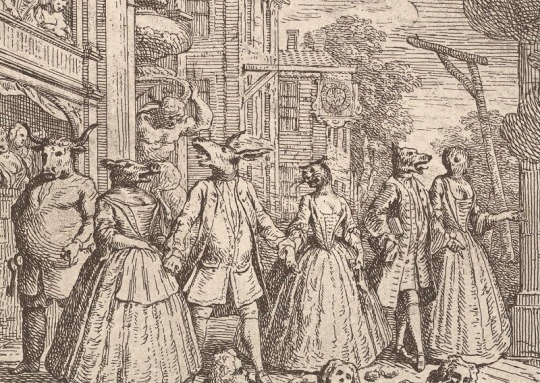
4. Oscar Isaac with Punch Brothers & Secret Sisters - Hang Me, Oh Hang Me
A poor boy who got "so damn hungry he could hide behind a straw", made his last stand with a rifle and a dagger, and has been all around this world, and is positively done with it.
They put the rope around my neck, they hung me up so high Last words I heard 'em say, won't be long now 'fore you die Hand me, oh hang me, and I'll be dead and gone Wouldn't mind the hanging, but the laying in the grave so long
2015, from Another Day, Another Time: Celebrating the Music of "Inside Llewyn Davis", after Oscar Isaac's rendition in Inside Llewyn Davis, 2013, in turn after Dave Van Ronk's rendition in Folksinger, 1962 lyrics & music: traditional American/unclear origin, folk song with various titles (I've Been All Around This World, The Gambler, My Father Was a Gambler, The New Railroad), first recorded by Justis Begley, 1937
5. Chapel Hill - Seven Curses
Cover of a Bob Dylan song, telling us the dark tale of a judge who's about to send a man to the gallows for stealing a horse, promises his daughter he'll show clemency if she agrees to sleep with him, and then reneges on his promise.
The next morning she had awoken to know that the judge had never spoken she saw that hanging branch a-bending she saw her father's body broken These be seven curses for a judge so cruel
2013, from One For The Birds lyrics inspired by Judy Collins's "Anathea" (1963), in turn inspired by the traditional Hungarian ballad "Feher Anna", who curses the judge "thirteen years may be lie bleeding" lyrics & music: Bob Dylan, recorded 1963, released 1991 in The Bootleg Series
6. Ewan MacColl - Go Down Ye Murderers
A song about Timothy Evans, a man accused of murdering his wife and child, which he denied until his last breath. They convicted him and hanged him in 1950. He was 25 years old. Three years later the real murderer, his neighbour John Christie, confessed, and the case played a major role in abolishing capital punishment in the UK.
The rope was fixed around his neck, and the washer behind his ear And the prison bell was tolling but Tim Evans did not hear Sayin' go down, you murderer, go down
They sent Tim Evans to the drop for a crime he didn't do It was Christy was the murderer, and the judge and jury too Sayin' go down, you murderers, go down
1956, from Bad Lads and Hard Cases: British Ballads Of Crime And Criminals lyrics & music: Ewan MacColl
7. Jennifer Lawrence - The Hanging Tree
One of the stranger things that can happen at the hanging tree is camaraderie. "On the gallows tree, all men are brothers", to quote A Feast for Crows, and when the state murders, then in defiance, an execution ballad can become a protest song. Many have in real life, this one is fiction, from The Hunger Games. Wisely, the director asked the composer for a simple tune, nothing elaborate, something that could be "sung by one person or by a thousand people".
Are you, are you coming to the tree? Wear a necklace of rope side by side with me Strange things have happened here, no stranger would it be If we met at midnight in the hanging tree
2014, from The Hunger Games: Mockingjay – Part 1 OST lyrics: Suzanne Collins music: James Newton Howard
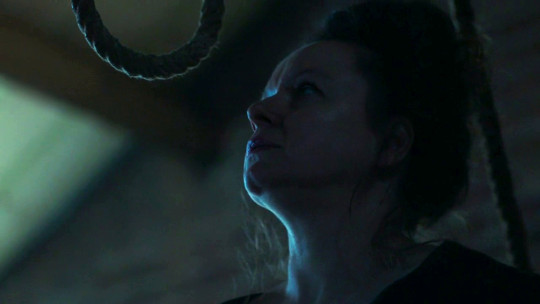
8. Let's Play Dead - Heaven and Hell
A fairly traditional execution ballad written recently for the series Harlots. Margaret Wells sings it to herself for consolation and courage, as she sits alone in a cell, waiting to get dragged to the gallows.
I'm no more a sinner than any man here I'm no less a saint than the priest at god's ear But now I am snared, they will punish me well With a ladder to heaven and a rope down to hell
2018, from the single Heaven and Hell, for Harlots Season 2 Episode 7 lyrics & music: Let's Play Dead
9. Odetta - Gallows Pole
Probably the most well-known execution ballad of the 20th century, thanks to several iconic renditions. This one remains my favourite.
Hangman, hangman, slack your rope, slack it for a while I think I see my father coming, riding many a mile Papa did you bring me silver, did you bring me gold? Or did you come to see me hanging by the gallows pole?
1960, from At Carnegie Hall lyrics & music: traditional (Child 95 / Roud 144), known under many other titles ("Hangman", "The Maid freed From the Gallows", "The Prickle-Holly Bush"); this version is directly influenced by Lead Belly's "Gallis Pole" (1930s), and they both informed Led Zeppelin's 1970 version
10. Johnny Cash - 25 Minutes to Go
Peak gallows humour, uproariously funny and defiant, and somehow still conveying the terror of a man who's about to die and emphatically doesn't want to. Performed live at Folsom Prison.
Then the sheriff said boy I'm gonna watch you die, 19 minutes to go So I laughed in his face and I spit in his eye, 18 minutes to go Now here comes the preacher for to save my soul, 13 minutes to go And he's talking about burning but I'm so cold, 12 minutes to go
1968, from At Folsom Prison lyrics & music: Shel Silverstein, from his 1962 album Inside Folk Songs
11. Johnny Cash - Sam Hall
A classic execution ballad with many versions (see here for its complicated history), some of which are stoic and dignified, and others humorous. But this one brims with rage. Sam Hall will not be repenting on the gallows, and he'll see you all in hell.
My name it is Sam Hall and I hate you one and all And I hate you one and all, damn your eyes
2002, from American IV: The Man Comes Around lyrics & music: : traditional, 18th century broadside ballad, Roud 369
12. Nick Cave & The Bad Seeds - Up Jumped the Devil
A song about a man doomed from the start to play the villain’s part, and the origin of this blog’s #swinging from the gallows tree tag.
Who's that hanging from the gallow tree? His eyes are hollow but he looks like me Who's that swinging from the gallow tree? Up jumped the Devil and he took my soul from me
1999, from Tender Prey lyrics: Nick Cave music: Nick Cave & The Bad Seeds
13. NOT ON SPOTIFY: Dead Rat Orchestra - The Black Procession
This ballad imagines a sinister procession of 20 criminals (black tradesmen brought up in hell!), each with their own specialty (it's mostly thieves of some sort), on the way to the gallows. The last and worst of them is the thief-catcher, and if one of them is innocent, they'll all go free. But of course none of them are. It's written in thieves' cant (lyrics and more context here), and the chorus means: "Look well, listen well, see where they are dragged, up to the gallows where they are hanged."
Toure you well; hark you well, see where they are rubb’d, Up to the nubbing cheat where they are nubb’d.
2015, from Tyburnia: A Radical History Of 600 Years Of Public Execution lyrics: from The Triumph of Wit by J. Shirley, 1688 music: Robin Alderton, Daniel Merrill & Nathaniel Robin Mann
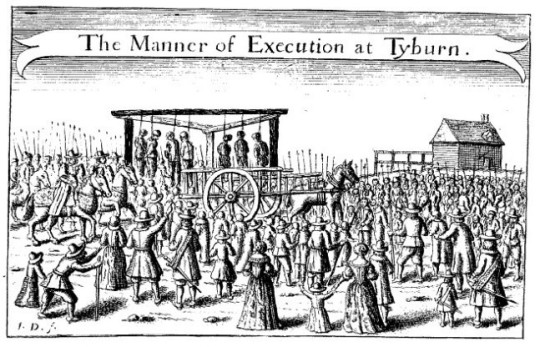
14. John Harle & Marc Almond - The Tyburn Tree
And where does the Black Procession lead? To Tyburn, of course. The dark gothic side of Marc Almond.
The Tyburn Tree, I weep for thee, blood in the roots 'Tis not a tree with bark and leaves of spring awakening 'Tis not a tree with blossom and fruit, 'tis not a tree No boughs to bend beneath the unruly breath of winter No memories of woods warmed by spring's sweet touch 'Tis not a tree — take a ride to Tyburn and dance the last jig
2014, from The Tyburn Tree (Dark London) lyrics: Marc Almond music: John Harle
15. CocoRosie - Gallows
Speaking of dark and gothic.
They took him to the gallows, he fought them all the way though And when they asked us how we knew his name We died just before him, our eyes are in the flowers Our hands are in the branches, our voices in the breezes And our screaming is in his screaming
2010, from Grey Oceans lyrics & music: Sierra Rose Casady & Bianca Leilani Casady
16. The Tiger Lillies - Hang Tomorrow
In their Two Penny Opera, the pioneers of dark cabaret reimagine Brecht’s Threepenny Opera, and take all the suaveness out of Mack the Knife. Here they also take all the fight out of him. What's even left? A pathetic empty husk, a bastard (let's not forget that Brecht's MacHeath is no rogue with a heart of gold, he's a horrible man) who can't even be intriguing. How disturbingly pedestrian.
So here I am in jail again, oh god it stinks of piss I've been in here since I was young, so I can reminisce It's looking rather grim this time, it's looking rather bad But if I swing tomorrow in some ways I'll be glad
2001, from Two Penny Opera lyrics & music: Martyn Jacques
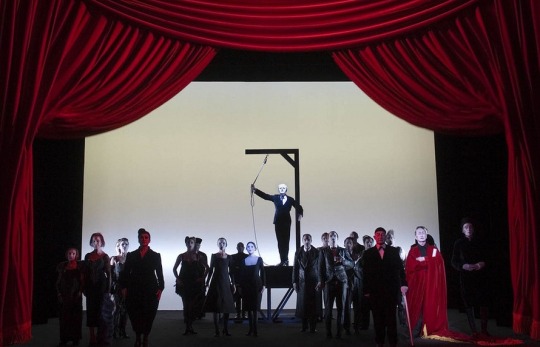
17. Tom Hollander - Ballad In Which MacHeath Begs All Mens' Forgiveness
In The Threepenny Opera, Mack the Knife stands on the scaffold and asks for pity. No point being judgmental now, that he's about to die. He morbidly describes how his dead body will end up, and then he lashes out at everyone, cops and criminals (same difference), while still begging them all for forgiveness. Very VERY sarcastically. The ballad's concept is borrowed from François Villon (see below), and this translation is unusually bold (honorific, see here and here for other translations and context).
You crooked cops with your Mercedes, your mobile phones, your trendy jackets, your cuts from drugs and dice and ladies, your Scotland Yard protection rackets.
Let heaven smash your fucking faces, slash you and let the blood run free and break you in a thousand places. I've pardoned you. You pardon me.
1994, from The Threepenny Opera - Donmar Warehouse Original Cast lyrics: Bertolt Brecht 1928, loosely inspired by François Villon's "Ballad of the Hanged" c. 1489, translated by Jeremy Sams 1994 music: Kurt Weill 1928
18. Saga de Ragnar Lodbrock - Ballade des pendus
And here's the OG Ballad of the Hanged, written in the 15th century by the OG poète maudit, François Villon (translation here). It paints an indelible picture of strung up corpses swaying in the wind, decaying, pecked by birds, ravaged by the elements and time. And crucially, it's in the first person. The hanged speak, begging their fellow-humans for pity, and god for forgiveness.
Frères humains, qui après nous vivez, N'ayez les cœurs contre nous endurcis, Car, si pitié de nous pauvres avez, Dieu en aura plus tôt de vous mercis. Vous nous voyez ci attachés, cinq, six: Quant à la chair, que trop avons nourrie, Elle est piéça dévorée et pourrie, Et nous, les os, devenons cendre et poudre. De notre mal personne ne s'en rie; Mais priez Dieu que tous nous veuille absoudre!
recorded 1979, released 1999 in the Saga de Ragnar Lodbrock reissue lyrics: François Villon, c. 1489 music: Saga de Ragnar Lodbrock

19. Nick Cave & The Bad Seeds - The Mercy Seat
Honorary inclusion, a song not about hanging: the mercy seat is the electric chair. But the lyrics are a punch and this is a torrent of a song, a whirlwind, a masterpiece, a 7-minute cynic snarl. So it couldn't possibly get left out of this compilation.
And the mercy seat is awaiting, and I think my head is burning And in a way I'm yearning to be done with all this measuring of proof An eye for an eye and a tooth for a tooth (a life for a life and a truth for a truth) And anyway I told the truth, and I'm not afraid to die (and I'm afraid I told a lie)
1999, from Tender Prey lyrics & music: Nick Cave
20. Graveyard Train - Ballad For Beelzebub
And after? Welcome to Hell, ladies and gents, and bards. (Bards are rogues, too.) The Graveyard Train play a kind of Southern Gothic (but very southern, they're Australian), and here they entertain the thought of a band that ends up in hell and has to keep playing, without end, for an audience that can't hear. What a bleak prospect.
Well the air on the stage is burning our lungs And we're all going deaf from the beating drums And you can't see a thing for all the blood and the sweat in our eyes
Well we played till we died, and now we're all dead But the Man says we got to get up there again And you can't come down till the brimstone turns to ice
2008, from The Serpent And The Crow lyrics & music: Graveyard Train
21. Samuel Kim feat. Colm R. McGuinness - Hoist the Colours
Yo ho, all together Hoist the colours high Heave ho, thieves and beggars
But we won't end in hell. The only acceptable ending to this compilation is the triumphant version (wait for it) of its beginning: a pirate's end. Traditionally the gibbet, yes, but also the ghost ship that still sails, the ripple that still travels, and the story that still gets told.
Did I stutter the first time?

NEVER SHALL WE DIE
#long post#swinging from the gallows tree#mixtape#trs#prison ballads#pirate#bard#The Threepenny Opera
56 notes
·
View notes
Text
The Merry Widow (1968) with Jeremy Brett
I've not been a lot on social media lately because of the complete takeover from US'ers (which - understandable, I'm worried and grieved too, but still there are other countries and issues and the way people often neglect to specify they're talking about the US and assume all their readers are in the US too is kind of obnoxious) so I've directed my very limited time and energy towards something which has given me a lot of joy in recent years and is often freely accessable too: old media. I'm making a valliant effort to actually finish Moby Dick and Les miserables and Raffles, I've read the first collection of Arsène Lupin, I'm trying to get into Hercule Poirot (not entirely convinced yet but we'll see), and last weekend I watched The Merry Window movie of 1968, starring Jeremy Brett. It is entirely on youtube here. Not in the best visual or auditory quality, sadly (it has not been remastered yet), but still very watchable.
I went into this without any knowledge of the story or rich history of this operette, only having heard a few fragments of the songs before. And I was so, so entertained throughout, even though I did not understand everything that was going on.
A summary of my prompt research: The Merry Window (Die Lustige Witwe) was composed by Austrian-Hungarian composer Franz Lehár and first performed on stage in 1905 in Wien, running a very succesful row of almost 500 live performances. It has since been adapted both on screen and stage often, even through this very day. The Metropolitian Opera has a comprehensive synopsis on the story on their website, but more fun is this comic.
The basic story goes as follows: the embassy of a small Balkan country (fictional, but likely to be inspired by Montenegro), situated in Paris, is thrown into merry chaos as they learn that a very rich widow originally from the same Balkan country also is residing in Paris. Shenagans and plotting occur to try and convince her to marry one of their countryman, so her sweet sweet money won't leave the country, which is in dire need of it. There's only a problem: the proposed candidate, a count played by Jeremy Brett, already knows the widow, and the two of them have a History. Avoidant behaviour, sassiness, misunderstandings and other delicious drama ensue.
I did not expect the amount of music and songs in this movie. I think 80% or 90% of the script is in song rather than dialogue. Entire performances are shown, during which the plot just stands still, and honestly? I loved it. Modern movies/shows often move too fast for my sluggish autistic brain to keep up with, and this languid tempo just worked well for me. The folk and, I imagine, quite scandalous can-can dances are a joy. I'm usually not that fond of the more classical technique of singing but I found the music here quite gorgeous, too, a delightful mix of classical sound with fun folk elements. Jeremy Brett's rich voice really stood out of me. You can listen to the entire soundtrack here.
Jeremy Brett is a treat to watch in his role as a bit of a playboy, avoiding responsiblities and commitment and feelings of heartbreak by dancing and drinking at a local nightclub each night instead. Not suprisingly for everyone who has seen him in Granada's Sherlock Holmes: he's really excellent at dramatic posing, lounging on surfaces not meant for that, and 'trying to look cool but actually besotted'. There's a lot of humour in the dialogue and performances of the entire cast, too. For example, there's an entire extramarital affair going on right under the nose of an antirely oblivious baron's nose, and it's pretty hilarious. Further example of some funny lines: "What have you been doing lately?" Absolutely nothing!" "Excellent!" Jeremy's rivalry with the widow (played by Mary Costa) is especially a lot of fun, both really sell that part. I really got quite emotional by the final "Love unspoken, faith unbroken..."
There's an interesting background of historical social context to this operette, too: widows in that time enjoyed an amount of financial freedom denied to either unmarried or married women, and watching high class men competing for a woman's money was, I suppose, a nice bit of social commentary. I also really enjoyed a song by a group of men all wondering what they have to offer women if it isn't money - a question, in my opinion, that may be asked more often. The widow using her relative freedom to protect another woman from scandal at the end was rather sweet, too. The story ends, of course, by not upsetting the status quo too much. But it's such a fun ride.
All in all, very much recommended.
34 notes
·
View notes
Photo

Béla Bartók
Béla Bartók (1881-1945) was an innovative Hungarian pianist and composer most famous for his classical works for piano and orchestra, string quartets, and songs, many of which present traditional Hungarian and other European folk themes. Bartók, a prodigious scholar and collector of folk songs, is widely considered one of the greatest musicians Hungary has ever produced.
Early Life
Béla Bartók was born on 25 March 1881 in Nagyszentmiklós (now called Sânnicolau Mare), then located in the Hungarian part of the Austro-Hungarian Empire (but today located in Romania). Béla's father was a teacher in the local agricultural college, and his mother was a piano teacher. Béla's father died when he was seven years old, and so mother and son moved to Pressburg (called Pozsony by the Hungarians), today's Bratislava in the Slovak Republic. Béla's mother taught him to play the piano from the age of five. He showed a rare talent and was already performing in public by the age of eleven; he had started composing his own pieces even earlier, at the age of nine.
Béla turned down a free scholarship to study at the music academy in Vienna and instead decided to attend the Royal Hungarian Academy of Music in Budapest from 1898. Bartók graduated in 1903. First earning a living as a concert pianist, from 1907, Bartók worked as a piano professor at the Academy. Although the post gave Bartók some financial stability, it was not quite what he had hoped for; he remarked that he was, in truth, "a reluctant teacher and would have preferred a research post" (Steen, 722). Bartók continued to compose, with early influences coming from the works of Franz Liszt (1811-1886), Johannes Brahms (1833-1897), Richard Strauss (1864-1949) – particularly his symphonic poem Also sprach Zarathustra –, and Igor Stravinsky (1882-1971).
Bartók's character and drive is here summarised by the music historian H. C. Schonberg:
Bartók was a tiny, frail man with explosive psychic force, prepared to go his own uncompromising way even if his music was never played. A stubborn integrity and an all-encompassing humanism animated the man, and he would not swerve from his ideal of truth.
(656)
Béla Bartók, 1903
Unknown Photographer (Public Domain)
Continue reading...
25 notes
·
View notes
Text
[ENG TRANSLATION] "It seemed like an impossible dream to perform on Sziget's Main Stage" - Exclusive interview with Joker Out
Original article written by Peti for MusicDaily on 25.07.2024. English translation by IG gurdonanna, X brnbergeron and X zozzzzie, proofread by IG gboleyn123

Video interview available here:
youtube
Formed in 2016, Joker Out became the fan favourite band of the Eurovision Song Contest in 2023. The boys represented the neighbouring Slovenia with their hit 'Carpe Diem', and this year they are finally coming to our country for the first time. Namely to Sziget Festival, at which they say was one of their biggest dreams to perform - or rather, never in their wildest dreams they could imagine to ever get about an hour long time slot at the main stage of such a big festival to prove their dedication and talent.
If you ask them, they describe their musical style as 'shagadelic rock n'roll', which roughly translates to very sexy rock n'roll mixed with the extravagant style of the '80s. They've toured the old continent, and in the UK, even Lewis Capaldi was curious to see what kind of party they put on. One thing is for sure, with their coolness, they put Slovenia on the musical map of the world, as they proudly use folk music in their sound, sometimes in the ex-Yugoslavian style.
We sat down with the boys for a Zoom call before their performance at Sziget Festival, where Kris, Jan, Jure and Nace were present.
We asked them about their song 'Bluza', of course, but also about the new album, Sziget and their experiences at the Eurovision Song Contest. The guys already knew a few Hungarian words, which we will only reveal in the video version, while you can read the whole interview below - exclusive interview with Joker Out.
It's so nice to see you. How are you today?
We are good, right? I think we are well woken up right now, because usually this would be too early for us, but we've been doing interviews for the past hour and a half, so we are in a good mood right now.
You'll be playing your first show in Hungary in less than a month. Have you ever been to Hungary before?
Yeah, yeah. But I think we've only been to Budapest so far.
This summer, you'll be performing at Sziget, which is like one of the biggest festivals in Central Europe. How excited are you about the show, and what can your fans expect from it?
I think we are all very, very, very excited for it, because especially playing on the main stage has always been one of those unachievable dreams, like we never thought it will ever happen. So it's very surreal, that we'll play there, and so accordingly we are gonna give it our all onstage.
We'll have everything with us: screens, lights, special effects, to make it worthwhile for everyone, for those who already know us and those who don't yet.
And your fans are very curious if there will be any unreleased songs at the concert...
We haven't decided on the setlist yet.
We have so many released songs, so it would probably be a mistake not to play them. The thing is, we probably won't have a lot of time to play, so we have to prioritise... and those are definitely going to be the released ones.
And speaking of concerts, do you have any pre show rituals that you always do before concerts?
When the intro starts rolling... there is always an intro. When the intro comes on, and we hear it in our earpieces, we do this [demostrates] and it's like, unifying our energy before we go on stage.
Sziger Festival is also called "The Island of Freedom". So I'm curious, what does freedom means to you personally?
Freedom from alarm clocks. That is definitely one of the biggest freedoms I enjoy and do not take for granted in my life.
Freedom is to be able to freely express your opinions on any topic, and to walk around on the streets of your town without feeling danger, that anything might happen to you. That is a kind of freedom we take for granted, but maybe it is good to sometimes think that it's not the same for every person in the world.
And the freedom when we are creating music. We don't have labels on us that are pushing us. And being able to live from music. That's freedom to me. Being able to do what you want and to have the financial means to feel free and to enjoy this.
If you could change just one thing about the world, what would it be?
That there would be no jealous or greedy people in the world anymore.
And I would try to make the borders between countries disappear as much as possible.
No more music on Spotify, only on CDs and records. And stop spreading false information and only share what is objectively true. It's a hard one, but it's a good sentiment.
You just released your latest song 'Šta Bih Ja'. Can you tell us a bit about the background of the song? What inspired it, and what is the message you want to convey with it?
The background to the song is that we went to London for two months, in January and February, to create our new album, and this was the first song we composed. We actually put this song together very quickly in January, in maybe like the first or second session in our new rehearsal space there.
Musically it's very up-tempo, energetic and a bit ex-Yugoslavia inspired, but the lyrics are darker than the music itself.
So there's a bit of contrast. The message or the vibe of the song is kind of what we felt when we went to England. The feeling of being a stranger in a big city, not knowing many people, and knowing that someone you love is waiting for you somewhere else, but you can't reach them at that moment. That's pretty much what it's about.
How is your new album shaping up?
Slowly, but good. Very slowly. But very good.
What three words would you use to describe the album?
To describe the album in three words? Not released yet.
If I had to say one word, I'd use "cocktail". Because it will have different languages and musical styles. Love... of course. And an album full of hits. So the three words: cocktail, love and hits.
Your fans are particularly excited about one song, and that's 'Bluza'. Do you know when it will be officially released?
I just recorded the drums for the second time yesterday, so slowly, probably in a couple of weeks. I mean to finish it, not to release it. We haven't even finished it completely, but we'll probably release it before the album.
This is going to be the next single, so probably in late August or
September.
September, yeah. Hopefully. Don't take it for sure, but yeah, because
it's a song that we all really love, and we feel it's very special, so we want it to be perfect for release.
Now let's talk about Eurovision, a very famous competition with a very long history. So I wonder how you prepared for it emotionally?
I think there was not much emotional preparation. Everyone says that Eurovision is intense, and you have to prepare and stuff like that. But nobody, at least the first time they go to Eurovision, really understands what is meant by that. So you just go into it like 'yeah, I'm gonna do this', and then when things start happening you realise it's really intense, but by then you're already way too deep into it to start preparing. So what we did was more like surviving Eurovision, doing everything we could and then trying to process what happened.
It's much easier for us because we're a band. We can do it together and so relieve the pressure of interviews or performing on stage. So it's much easier than being a solo artist.
Do you have a favourite memory from your Eurovision journey?
Barcelona, Barcelona. The pre-parties. Those were awesome. Oh yeah, getting to the final... the semi-final too. The semi-final was great.
Finally, do you have any message for your Hungarian fans?
First of all, it's very nice to see that we have Hungarian fans, because although it's a neighbouring country to Slovenia, it's a very different country. We don't share many cultural aspects, especially in music, so we're happy that we have fans there to play for, and we hope that one day we can play our own concert in Budapest.
We promise to try to make that happen as soon as possible. See you there, and at Sziget!
35 notes
·
View notes
Note
So, I visited Europe for the first time in my life a few weeks ago - Rome specifically, right after the Pope opened the Christmas season there - and for the first time in my life tried roasted chestnuts. Are they always that sweet? I will admit to not liking nuts so the fact that they were easier to choke down than I expected was somewhat revelatory, but like still odd. Do you like roasted chestnuts? Also, how does conkers work?
Mostly asking because youre my best European source of knowledge of such things - there's no chestnuts to be had in America
First, there are two kinds of chestnuts, the kind you eat (Castenea, Sweet Chestnuts and the kind you don't (Aesculus, Horse Chestnuts).
(Water chestnuts, which don't grow on trees, are something else entirely.)
Second, there are definitely Castanea chestnuts in America, though I'm betting they're a regional thing so if you're not in the region, hard cheese, and they even appear in the first line of "The Christmas Song".
Chestnuts roasting on an open fire, Jack Frost nipping on your nose, Yuletide carols being sung by a choir, And folks dressed up like Eskimos.

The edible ones are definitely sweet, it's even in their name, but the burnt smell of them cooking might suggest they'll taste otherwise, so that can come as a surprise.
I don't care for them myself, though roasted chestnut purée mixed with rum, then topped with unsweetened whipped cream and maybe chocolate sauce is another matter entirely.

This treatment is variously credited as Hungarian, Italian and French; those who want to argue about it can sit over there, because sensible people who want to get on with eating it will be sitting over here...
*****
As for Aesculus conkers, the easiest way to explain them is to point you to this post.

Wearing schoolboy caps, oversized wellies or a severe short-back-and-sides haircut isn't compulsory, but might help. Or not.

68 notes
·
View notes
Text
new newsletter 🎧
#estimated reading time says 24 minutes..... sorry angels i got a bit excited. but i hope u have fun reading this !!! <3#also yayyy first post on medium bc fuck substacks nazi ass leadership#l#newsletters
35 notes
·
View notes
Text
I had a hungarian folk song stuck in my head all day at work. so now that i'm off work i am listening to. Yup you guessed it happy hardcore
8 notes
·
View notes